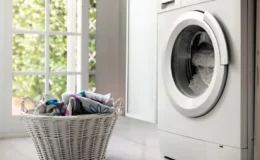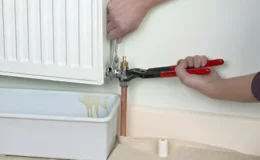
Preventing Kitchen Fires Complete Guide
The kitchen is the nub of activity in every household. Whenever food is prepared there is always interest and curiosity. Those appetizing smells drifting through the house teasing your taste buds, playing havoc with the sensory cells in your nose. The smell of fried bacon, fresh coffee, baking bread all has a certain desire to want to consume food.
The kitchen although a place to socialize when food is being prepared it can also be a hotspot for accidents and fires!
Fires don’t usually start themselves, there is a reason why they happen, which we will explore in this article. Some precautions are obvious, which you probably adhere to, but some aren’t. Compared to other rooms in the house, the kitchen is where most fires breakout!
Cooking with gas is the preference of chefs and cooks as heat control is more responsive than electricity, as the flame performs better with different utensils.
Staying safe is not just for the household cook, it’s for everyone in the family!
Tips for preventing kitchen fires
- Name/Model of a piece of equipment.
- Don’t leave the kitchen unattended.
- Leaving anything unattended while taking a shower or phone call, gives that dish under the grill an opportunity to overheat and catch fire. Turn off the heat if leaving the kitchen, leave nothing unattended!
- Open windows: Curtains blowing in the breeze can catch the flame on the gas burner and start a fire. Close the windows, tie off the curtains so they are away from the heat source/naked flame!
- Distractions: The phone rings or there’s a knock at the door, our curiosity takes over we answer both and forget the chip pan is on ‘high’. Just as we answer the door we can smell burning fat, but I need to acknowledge my Amazon delivery first (let’s hope it’s a fire blanket and extinguisher!). The fire could be out of control by the time you return to the kitchen! Turn down, turn off or remove the pan from the burner altogether before leaving the kitchen!
- Children: Never leave small children alone in the kitchen whilst preparing food. To a small child that chip pan (full of boiling oil) with the handle sticking out could just be within their reach! With pans make sure the handles pointing towards the back of the stove (not overhanging). According to current surveys (London Fire Brigade), 60% of house fires begin in the kitchen.
- Clothing: Another danger! Many man-made fabrics are highly flammable. Cotton and linen-based fabrics can easily catch fire if not infused with a flame retardant. The thinner the material the easier it burns. So, it’s not advisable to cook in that ballroom gown, Halloween outfit, or pantomime costume when cooking with heat! A modicum of common with cooking attire, please!
- Smoke or heat alarms: These are great devices and should be placed around the property and close to sleeping quarters. The minute smoke rises it will trigger the alarm, alerting the household so they can evacuate (if needed). You might be an awesome cook but when the smoke alarm cheers you on you need to take action! A heat alarm is also a good addition to the smoke alarm family. A heat alarm can detect any change in temperatures i.e. when steam is present which may not be detected by a smoke alarm. Don’t cut corners, skimp or penny-pinch with these devices, they are designed to save lives! The batteries will need to change periodically. You will receive an audible reminder when the battery is flat – don’t ignore it!
- The timer: Memory it’s a wonderful thing, the only problem is it lets you down when you need it most. We all tend to be forgetful from time to time, like forgetting your partner’s birthday (you only forget it once though). That roasting joint or casserole takes a long time to cook but you don’t have to wait around until it is. Just set the timer. The audible alarm (on loud) will remind you soon enough when the dish is perfectly cooked and ready to serve.
- Feeling under the weather: Assess the risk if you’re feeling unwell. Cooking with gas/electricity, using pans filled with hot water/fat are health and fire risks. Is your medication making you feel drowsy, just tired, or had too much alcohol? Always err on the side of caution. Why not skip cooking and call Uber Eats, Deliveroo, or the pizza parlor and get dinner delivered?
- The chip pan/Wok: When oil or fat gets too hot it boils then starts to smoke, soon after it will catch fire! This where your smoke alarm earns respect, giving you a much-needed early warning of the danger – hopefully you are nearby to turn the burner off/down or remove it from the heat before it ignites?
- Flammable items: Cooking requires oven gloves, kitchen towels, tea towels, etc. Are close by, ready to use but all are highly flammable. Do not put flammable items on hot surfaces and certainly not near the hob or grill!
- Things you should not put in the microwave.
Plastic, china, glass, etc are all microwave friendly. Food, milk, coffee, water, etc., etc. when heated converts the energy into steam and is released safely. However, with metal items, it can’t convert them to steam and very quickly heat up to a point where they eventually catch fire. Things to watch out for, crockery with gold/silver trimmings around the rim or in the center. These items are not safe to put in a microwave. - Keep the stove clean: Remove any food debris that’s fallen near the burner or hot plates. Grease or oil can be fire starters! So, clean up after cooking!
Putting out a kitchen fire
- A fire blanket
- An extinguisher with the appropriate rating (contact The London Fire Brigade for advice).
Chip pan fire
Golden rule: Never throw water on burning oil – it could cause a fireball!
Only when safe to do so, turn off the heat – cover the pan with the blanket, cutting off the oxygen stopping combustion. When the blanket is over the pan step back and wait, be patient (20-30 minutes). When safe to do so, and only when the oil is at room temperature remove the pan/fryer outside.
Putting out an electrical fire
An electrical fire can be just as serious. The problem with an electrical fire is things could become ‘live’ without knowing it!
Therefore, always cut off the electricity from the mains supply into your property before continuing!.
When purchasing a fire extinguisher for the home make sure it is correctly rated for use on an electrical fire. Always seek advice for the best extinguisher to tackle electrical fires before purchase. Not under any circumstances are we suggesting you become a firefighter – never! Always call 999 to be on the safe side!
Dry Powder This is a flexible and sensible compound for confronting most fires, particularly electrical ones. Carbon Dioxide extinguishers are good for electrical and combustible liquid fires. Many motor vehicles carry one in case of a fire. Always put your safety and the family’s first! Do not take unnecessary risks!. In the event of a fire evacuate everyone from the property and call 999 if you believe the fire is outside your capabilities.
Conclusion
Many kitchen fires are caused by a lack of care and attention to detail, with devastating consequences. You are using heat and fire when cooking, both are hazardous if not treated with respect. The kitchen is a creative area for your culinary delights so cook safely, be safe and protect others.






